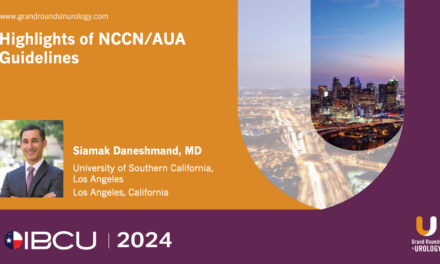Sam S. Chang, MD, MBA, presented “Controversies in NMIBC: Guidelines and Beyond” at the 6th International Bladder Cancer Update on November 19, 2022, in Scottsdale, Arizona.
How to cite: Chang, Sam S. “Controversies in NMIBC: Guidelines and Beyond” November 2022. Accessed Feb 2026. https://grandroundsinurology.com/controversies-in-nmibc-guidelines-and-beyond-2023/
Controversies in NMIBC: Guidelines and Beyond – Summary
Sam S. Chang, MD, MBA, the Patricia and Rodes Hart Endowed Professor of Urologic Surgery and Oncology and the Oncology Fellowship Director and Vice Chair of Urologic Surgery at Vanderbilt University Medical Center in Nashville, Tennessee discusses guidelines related to non-muscle invasive bladder cancer (NMIBC). He outlines the goals and purpose of the American Urological Association (AUA) NMIBC guidelines and how they provide a risk-stratified clinical framework for the management of NMIBC. Dr. Chang outlines the goals of therapy, emphasizing both the importance of appropriate, aggressive therapy for high-risk tumors, but also of reduced therapy and management for low-risk patients to avoid overtreatment. He addresses the Bacillus Calmette-Guérin (BCG) shortage, which will likely persist for several years. Dr. Chang cites updates to American Urological Association (AUA)/Society of Urologic Oncology (SUO) guidelines for NMIBC, as well as European Association of Urology (EAU) guidelines and National Comprehensive Cancer Network (NCCN) guidelines, explaining some of the nuances. While there are many guidelines with different methodologies, there is not much controversy over management strategies for NMIBC patients. He discusses guidelines recommending the use of blue light cystoscopy (BLC) to increase detection and decrease recurrence and addresses controversy due to a study, suggesting BLC does not improve the three-year recurrence-free rate. Dr. Chang concludes that BLC is preferred as the best way to optimize tumor resection and tumor identification. He turns to the AUA Risk Stratification Table and explains data that show risk-stratification does work and helps individualize care. Dr. Chang shares a risk-stratification tool endorsed by AUA that allows clinicians and patients to easily see if there is a relevant clinical trial available to them. He then shares EAU guidelines, pointing out these have split high-risk patients into high-risk and very-high-risk categories. Dr. Chang addresses recent controversy regarding the intermediate-risk category and efforts to further break out that category in ways that are helpful to clinicians. He then states that groups have similar treatment recommendations, but show them in different ways, such as the NCCN guidelines that are most often referenced by oncologists, as well as an iterative AUA guideline algorithm. A high-risk case study shows the guidelines are in close agreement as far as treatment (BCG), but not in agreement when alternatives to BCG are needed, as there is no standard or clear regimen that is recommended. Dr. Chang addresses options, including a combination chemotherapy with gemcitabine and docetaxel for BCG-naive patients and treatment with intravesical chemohyperthermia with mitomycin C (CHT), citing a dearth of research data available for chemohyperthermia. He addresses cystectomy, emphasizing that it is curative, as well as variant histology, referencing an update to AUA guidelines. Dr. Chang addresses treatment options for BCG-unresponsive NMIBC. In conclusion, Dr. Chang highlights the ongoing BCG shortage and its effect on treatment choices, but explains that FDA-approved systemic therapy is currently available for BCG-unresponsive disease, improvements in treatment and risk-stratification continue, risk-stratification continues to determine therapy and surveillance strategies, intravesical and/or systemic therapies are being studied and need enrollment support, and future improvements in tumor resection and predictive and prognostic biomarkers continue to develop. He emphasizes that all of this makes this an exciting time for cancer research.
About the 6th International Bladder Cancer Update:
The International Bladder Cancer Update (IBCU) is a CME conference focused on the diagnosis and treatment of bladder cancer. The conference offers medical professionals an opportunity to listen to updates from, and interact with, expert international faculty to improve knowledge and determine best treatment practices to improve patient outcomes. IBCU encompasses expert lectures, interactive discussions, a panel roundtable, debates, and case presentations. It is physician-led, multi-supported, and designed for urologists, urologic oncologists, and other healthcare professionals involved in the treatment of bladder cancer.
For further educational activities from this conference, visit our collection page.
ABOUT THE AUTHOR
Sam S. Chang, MD, MBA, is the Patricia and Rodes Hart Endowed Professor of Urologic Surgery and Oncology and the Chief Surgical Officer of the Vanderbilt Ingram Cancer Center in Nashville, Tennessee. Dr. Chang is a graduate of Princeton University and Vanderbilt University Medical School. He completed his uro-oncology fellowship at Memorial Sloan-Kettering Cancer Center and obtained his MBA at Vanderbilt’s Owen School of Business.
Since his return to Nashville, Dr. Chang has focused on urologic oncology and education and has led efforts in integration of evidence-based medicine in clinical pathways, enhanced national guidelines formulation, and improved urologic cancer staging. He has orchestrated the initiation and expansion of multiple cancer-related treatment protocols at Vanderbilt and elsewhere. Dr. Chang has served as Chair of the Society of Urologic Oncology (SUO) Panel on Hormone Refractory Prostate Cancer, Chair of the American Joint Committee on Cancer (AJCC) GU Staging Task Force, the facilitator and Vice-Chair of the Renal Malignancy Follow-Up AUA Guidelines Panel, the chair of the AUA/ASCO/ASTRO/SUO Guidelines on Nonmetastatic Invasive Bladder Cancer, and Chair of the AUA Prostate Cancer Core Curriculum Committee. He completed his term (2018-2022) as Assistant Secretary of the American Urological Association in charge of International Relations with Europe and the Middle East and served as a member of the initial AUA Task Force on Diversity and Inclusion.
Dr. Chang was a member of the AUA Renal Mass Guidelines as well as the AUA Upper Tract Cancer Guidelines and is a current member of the National Comprehensive Cancer Network (NCCN) Bladder Cancer Panel. His current leadership roles include Secretary of the SUO (2022-2026), Chair of the American Board of Urology Examination Committee (2020-2024), and Trustee for the American Board of Urology (2024-2030).
While maintaining a busy clinical surgical practice, Dr. Chang has authored more than 300 original publications and multiple book chapters. He has also edited several textbooks. For his academic efforts, he received the SUO’s first-ever Distinguished Service Award, aCaPCURE Young Investigator Award, and has been named multiple times as a Journal of Urology’s Best Reviewer. Dr. Chang was named as the 2011 recipient of the American Urologic Association Gold Cystoscope Award and was nominated as Fellow of the Nashville Health Care Council in 2016. His education and mentorship efforts have been recognized with his Department's Best Teaching Faculty Award as well as the Christine Manthos Mentoring Award from the Society of Women in Urology (SWIU).




